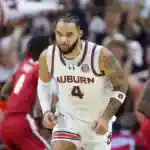The NCAA Tournament was subject to plenty of think pieces after the first weekend came and went without much of a splash. Even from myself. Well, the Basketball Gods heard us all loud and clear. In the Sweet 16 on Thursday, No. 3 seed Texas Tech and No. 10 seed Arkansas engaged in what will almost certainly be remembered as the signature game of this year’s tournament.
Trailing by 13 points with just 4:43 remaining, Texas Tech pulled off one of the most improbable comebacks ever before seen in March. The Red Raiders forced overtime with a 16-3 run to end regulation before Darrion Williams made the game-winning lay-up in with 9.3 seconds remaining in the extra period. Texas Tech trailed by as many as 16 points in the second half, which is tied for the fifth-largest comeback in NCAA Tournament history. It was also the second-largest comeback to occur in a Sweet 16 and the third-largest comeback to occur past the second round of the dance.
To avoid recency bias, I won’t rank TTU’s comeback among the following. Just know this is the company coach Grant McCasland, J.T. Toppin and company joined with their improbable win on Thursday.
2001 Final Four: (1) Duke 95, (3) Maryland 84. 22-point deficit.
Two months and four days after Jay Williams and Duke pulled off the “Miracle Minute” against the Terps in College Park, the Blue Devils again ripped Maryland’s hearts out with the biggest comeback in NCAA Tournament history in the 2001 Final Four.
Trailing 39-17 with just under seven minutes remaining in the first half, Duke ended the frame on a 17-10 run to trim Maryland’s halftime lead to 49-38. From there, the floodgates opened. The Blue Devils flipped the 11-point halftime deficit into an 11-point win, outscoring the Terps 57-35 in the second half to advance to the title game. Duke went on to beat Arizona, 82-72, in that final, winning the school’s third national championship.
2005 Elite Eight: (4) Louisville 93, (7) West Virginia 85. 20-point deficit.
The night that West Virginia’s Kevin Pittsnogle became an NCAA Tournament immortal, even in a loss. The No. 7 seed Moutaineers already needed an improbable run to get to this point and they were given little regard in this matchup as 8.5 point underdogs. Pittsnogle and his teammates made 10 first-half triples as the Mountaineers shockingly built a 38-18 lead with 2:51 remaining in the frame. However, Louisville closed the half on a 9-2 run to trim WVU’s lead to a manageable 13 points at the break.
Louisville outscored West Virginia 50-37 in the second half. However, the Cardinals’ rally wasn’t as seamless as Duke’s in 2001. Pittsnogle stifled Louisville’s initial run by burying a second-chance 3 with 6:45 remaining, again pushing West Virginia’s lead to double-digits. Louisville again had an answer, closing the game on a 19-8 run to force overtime.
Louisville’s Larry O’Bannon forced overtime by burying a contested lay-in with 38.2 seconds remaining. O’Bannon scored all 24 of his points that night in the second half and overtime to help send Rick Pitino to his first of three Final Fours at Louisville.
2006 Sweet 16: (2) UCLA 73, (3) Gonzaga 71. 17-point deficit.
A game and a comeback that created one of the lasting images in the tournament’s history. A crestfallen Adam Morrison, with his arms wrapped around his knees and his tearful face buried beneath his hands. It was a sombering realization that arguably the most iconic player in the Zags’ illustrious recent history would end his career without reaching an Elite 8.
Morrison stretched Gonzaga’s lead to a game-high 17 points, 37-20, on an and-one with 3:17 remaining in the first half. Gonzaga led by 13 points at halftime and led 69-59 with just five minutes remaining. UCLA closed the game on a 13-4 run, taking a 72-71 lead with 8.6 seconds remaining after Jordan Farmar forced a Gonzaga turnover and found Luc Richard Mbah a Moute for what was the game-winning lay-up. This game also gave us one of the great Gus Johnson calls, Heartbreak City!
Editor's Pick
 NCAA March Madness: What We’ve Learned So Far
NCAA March Madness: What We’ve Learned So Far